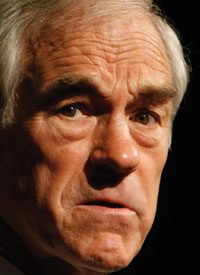
The prime architect of the Federal Reserve was German immigrant Paul Warburg. Arriving in America in 1902 with brother Max, he married into the family controlling Kuhn, Loeb and Company, America’s prime international banking firm. By 1907, he was earning $500,000 annually, an enormously generous salary at a time when there was no income tax and inflation had not begun eroding the value of the dollar.
Already conversant with the power possessed by European central banks, Warburg insisted for the next few years that America needed a similar banking establishment. He teamed up with Rhode Island’s Senator Nelson Aldrich and, in 1910, the two were among the seven who met secretly at Jekyll Island, Georgia, to plot creation of the Federal Reserve. Enacted by Congress supposedly to curtail the power of the “money trust,” the Fed did exactly the opposite. And when Paul Warburg left Kuhn, Loeb and Company to accept a post on the first Federal Reserve Board, he would earn only $12,000 yearly.
Warburg’s willingness to take such a huge cut in salary is only one clue to the most important purpose of the Fed. From its inception, the acquisition of power, not wealth, was the goal of its creators, even though many opponents of the Fed down through the years have indicated otherwise. When Mayer Amschel Rothschild of the European banking empire bearing his name stated, “Let me issue and control a nation’s money and I care not who writes the laws,” he indicated that a nation’s political leaders would do the bidding of those who controlled money. No one has ever proved him wrong.
Professor Carroll Quigley’s 1966 opus Tragedy and Hope contains many important revelations. He bared the existence of a secret society that planned to rule the world, even naming the Council on Foreign Relations as its American branch. He labeled this secret group’s remarkably ambitious project a “network” rather than a conspiracy because he had no aversion to any of its goals. He further admitted gaining permission to examine “its papers and secret records” for several years. (Where he went to do such examining has never been revealed.) But early in his 1,350-page book, the Georgetown University historian pointed to the “far-reaching goal” of the “network” he so admired. He wrote that the “powers of financial capitalism” sought “nothing less than to create a world system of financial control in private hands able to dominate the political system of each country and the economy of the world as a whole.”
That squares exactly with the goal of power mentioned years before by Rothschild. Quigley then offered: “This system was to be controlled in a feudalistic fashion by the central banks of the world acting in concert, by secret agreements arrived at in frequent private meetings and conferences.”
Central banks of other nations would act “in concert.” Didn’t the Fed rescue some European banks when the economic crisis hit? As for the “secret agreements arrived at in frequent private meetings and conferences,” isn’t this what goes on at the Bilderberg conferences; Council on Foreign Relations and Trilateral Commission meetings; annual sessions in Davos, Switzerland; and elsewhere? While no participant at these closed-door powwows is poor, the goal of the movements into which they have immersed themselves has always been power more than personal wealth.
John Birch Society founder Robert Welch knew well the true purpose of the Federal Reserve. In a statement he wrote in 1972, he scornfully dismissed the attitude held by some that the goal of the conspirators who foisted the Fed on America was simply money. “What all of these Insiders were after was not money but power,” he insisted. And he continued, “They were even careful to plan the whole arrangement so that the bulk of any commercial profit made by the Federal Reserve would go to the federal government as a coverup for their nefarious intentions.”
Congressman Ron Paul (picture, above left) has earned the thanks of all true Americans with his efforts to combat the Fed — not only to have it audited but also eventually to have it abolished. His “Audit the Fed” proposal in the current Congress has been inserted into a measure calling for broad new financial regulatory powers. Because he strongly disapproves of this addition to the federal government’s meddling where it doesn’t belong, he has indicated he won’t vote for the measure. “I will not vote for something that’s a disaster because one or two or five percent of it is an improvement,” he stated. It may yet pass, and there may be some movement toward an audit.
But his calling attention to the power of the Fed, and his successful gathering of 317 cosponsors of his audit measure in the House, has already created a huge awakening about the Fed among millions of Americans. All freedom-loving Americans should continue to alert fellow citizens about the power and overall purpose of the Fed so that it will soon be properly audited and eventually abolished. Stressing that power is its goal, not money, should help to stimulate many to make this extremely important campaign succeed.
Photo of Ron Paul: AP Images



